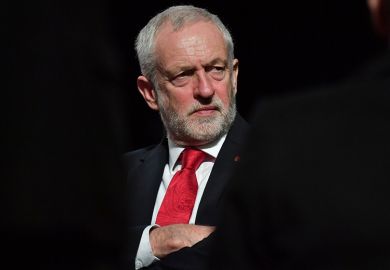A couple of things are clear about Jeremy Corbyn and Labour’s pledge to abolish tuition fees and bring back maintenance grants in England: it has stuck with the public as a clear, memorable policy and it is popular.
Putting its strengths or weaknesses as policy aside for the moment, the £11.2 billion pledge does seem to have been effective politics thus far. Polling by YouGov has found that scrapping fees scored top when it asked voters to remember Labour manifesto pledges, in their own words without prompting. The policy was cited by 32 per cent.
By contrast, the Conservatives most recognised policy was “care reforms or dementia tax”, cited by 36 per cent.
Anthony Wells of YouGov said scrapping fees was among Labour policies “which our polling has found the public support, and which are relatively clear and easy to understand”. Wells was referring to polling YouGov carried out after the publication of the leaked version of Labour’s manifesto, for which fieldwork took place on 11-12 May.
YouGov asked respondents for their views on six Labour manifesto policies. Overall, on scrapping tuition fees and bringing back grants, 49 per cent said it was a good idea, 36 per cent said it was the wrong priority and 15 per cent didn’t know.
Find our where students could most impact the general election result
Support was high among those planning to vote Labour (76 per cent thought it a good idea). There was also strong support among 18-24 year olds, the younger voters whom Corbyn is targeting (58 per cent thought it a good idea). Middle-class ABC1s liked it (53 per cent good idea) but so did working-class C2DEs on balance (45 per cent good idea, 32 per cent wrong priority).
That put scrapping fees as third most popular out of the six Labour manifesto pledges YouGov tested, with capping rent rises in line with inflation and increasing income tax for people earning over £80,000 scoring more highly. Not the most popular, but combining decent popularity with being memorable.
I thought the manifesto commitment on fees was sloppily written (it isn’t true to say that “last year saw the steepest fall in university applications for 30 years”) and that Corbyn had made much better attempts to explain the rationale behind the policy in his University and College Union speech and Times Higher Education interview. But the detail of the policy in the manifesto wording clearly isn't the most important thing when it comes to impact with voters.
Perhaps because Labour's fees policy was popular, the Daily Mail has been gunning particularly hard for it. The newspaper ran a 23 May story suggesting that “universities would be damaged” by the policy, according to vice-chancellors (based on fairly measured comments from Universities UK’s Nicola Dandridge). That was accompanied by a leader column on Labour’s “flagrant attempt to bribe students”.
There was more from the Mail on 30 May, when it said that Corbyn “has pledged to reduce or even write off £30 billion of student debt, without saying how it would be paid for”.
That was based on the Labour leader’s NME interview, in which he talked about those who had already taken out loans under the £9,000 fees system, saying the party was “looking at ways that we could reduce that, ameliorate that, lengthen the period of paying it off, or some other means of reducing that debt burden”.
The Institute for Fiscal Studies has indeed put the value of the outstanding stock of student loans (some of which are maintenance rather than fee loans) at £30 billion. Corbyn was careful not to commit to simply writing off outstanding loans, so he seems to have been properly briefed about the issues and costs here.
Corbyn gave a mention to the fees policy in the leaders’ (and stand-in) televised debate in Cambridge this week. He referred to the £11.2 billion cost (he just dropped it in casually to show he can remember how much his policies cost) and said it would be “money well spent” as an investment for the future.
Whether the onslaught against the policy from the Mail (and also the Sun) makes any difference to the policy’s popularity would be intriguing to see. But on the polling to date, the combination of being both memorable and popular has made it one of the most effective policies of the Labour campaign.
Unless Labour loses heavily and Corbyn is ejected from power, the party looks likely to stick with its thus far popular policy of publicly-funded higher education, which might be a significant shift in the debate about how England funds its universities.
Register to continue
Why register?
- Registration is free and only takes a moment
- Once registered, you can read 3 articles a month
- Sign up for our newsletter
Subscribe
Or subscribe for unlimited access to:
- Unlimited access to news, views, insights & reviews
- Digital editions
- Digital access to THE’s university and college rankings analysis
Already registered or a current subscriber?



